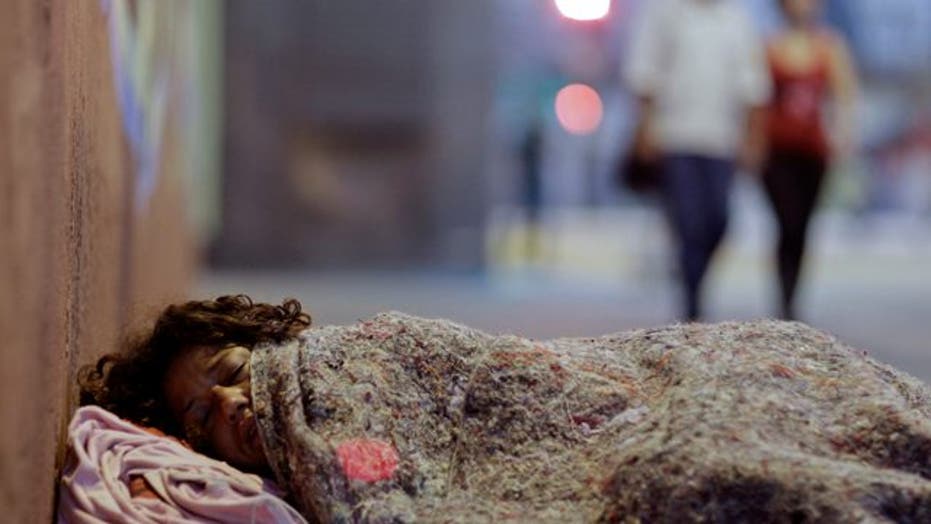Rio de Janeiro – Drug dealers in Rio de Janeiro, Brazil have begun what looks to become a city-wide halt on the sale of crack in the favelas they control.
Sale of crack in two favelas, Mandela and Jacarezinho, has been completely discontinued by order of their drug leaders, Al-Jazeera reported.
Mandela and Jacarezinho are part of the area known as “cracolandia,” or "crackland," where crack-cocaine trafficking and using is rampant.
“I am not going to lie to you, there is a lot of profit to be made on crack," a top trafficker in Mandela who used to manage all the crack operations told Al-Jazeera.
"But crack also brought destruction in our community as well, so we're not selling it anymore. Addicts were robbing homes, killing each other for nothing inside the community. We wanted to avoid all that, so we stopped selling it,” he told the television station.
- Anaheim Police Shooting Protest
- Best Pix of the Week
- Police strike in Rio, raising fears for Carnival
- Brazil’s leader vetoes portions of new forest law
- Police Strike Threatens Brazil Carnival
- In Booming Brazil, Crackland Thrives
- Havaianas Flip-flops are Symbol of Brazil
- One of America’s Most Wanted Sex Offenders is Caught in Brazil
- Christian Lopez, Brazil’s Glowing Mushroom and a Double Leg Transplant: It’s The Week In Latino News
- Alleged Serb drug gang swept up by Brazilian cops
- Women on Top in Latin America
- ‘The Girl from Ipanema’ Hits 50
- Latinos Undercover: Celebs You Never Guessed Had Hispanic Blood, Sí Señor!
- Latinos Representing USA in the 2012 Olympics
- Sexy ‘Agua Pura Brasil’ Bikinis
The drug gained popularity as the country’s economy boomed after years of hyperinflation, at a time when Brazilians had more cash in their pockets.
A crack rock can be bought for about $5 Brazilian Reals, roughly $3 American.
The cheap price aided the rise of crack addiction, coined by many as an epidemic in Brazil that infiltrated every class of people, from the destitute to the wealthy.
Though crack sales have only been stopped in two of Rio’s favelas, Flavia Pinheiro Froes, a lawyer to top Rio drug traffickers, said more drug lords are expected to join in and stop selling crack.
Her clients include some of Rio’s most dangerous drug traffickers, including leaders of Commando Vermelho, Amigos dos Amigos, and Terceiro Comando Puro -- Rio’s three main drug trafficking organizations.
"Our campaign is not only done in the communities directly with the traffickers that are selling, but also with some of the drug gang leaders that are in jail," Pinheiro Froes said. "I think convincing the seller could be one of the most efficient ways to combat crack because if there is no supply we will be able to solve the problem of the consumer."
She said the next step is to convince the gangs to stop purchasing from big suppliers, which include neighboring countries.
The actions of the drug leaders are not convincing the city's police officers.
Marcello Maia, part of the Rio civil police's drug crime investigation unit, thinks the move to stop selling crack is a ploy for citizen sympathy by residents of the favelas they control.
"I think this is just a trick that the traffickers are doing," Maia told Al Jazeera. "What they think is that now the police will stop combating other drugs they are selling, and we still stop entering their strongholds. But this is not what is going to happen."
Ending the crack addiction epidemic in the country has become a top priority for the Brazilian government.
President Dilma Rouseff launched the campaign “Crack, é Possível Vencer,” which translates to “Crack, it’s Possible to Overcome,” last December.
Since then, nearly $4 billion Brazilian Reals have been pledged to combat crack trafficking and treat addicts. The state of Rio de Janeiro alone will have received $240 million Brazilian Reals under the government initiative by 2014.
Even with funding backed by governmental programs and unprecedented moves like these of drug lords in Mandela and Jacarezinho, the Brazilian crack epidemic is far from over.
At other favelas like the Antares, crack dealing and addiction is rampant. The additive power of the drug makes combating it even more of a challenge.
In the drug underworld, an addict is willing to do anything for a fix. For less drug lords with less of a sense of community, this means heaps and heaps of money.
Research by the Federal University of Sao Paulo has shown that after five years, one-third of crack users had died, most of them from violence.
"For us doctors, there is a crack epidemic," said Ricardo Paiva, who monitors the spread of the drug for the National Council of Medicine, a group representing doctors, told the Associated Press last year. "We feel we're losing the war."
The Associated Press contributed to this report.









































